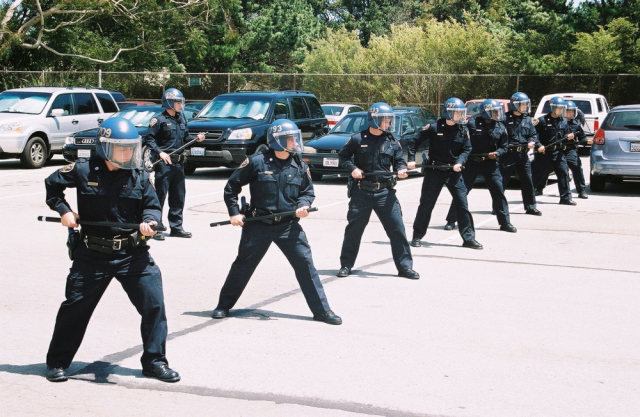Juries in San Francisco have not, by and large, been good to the people who go to court to challenge police abuse. The ruling in the Terrance Stangel case is no exception.
It’s tough to convict a cop of any crime, in any jurisdiction, and the DA’s Office presented the best case that was possible. But a jury that had no Black people (a serious problem that has to do with how jury pools are selected) and was clearly inclined to give the police the benefit of the doubt decided that the beating was justified.

And since Stangel, whose action has already cost the city $700,000, is facing no consequences, the verdict is only going to embolden other cops to use excessive force, believing they will get away with it.
But let’s take a step back here. In a crucial moment in the trial, well covered by MissionLocal, a cop who trains officers on use of force said that the beating was entirely justified.
From the Chron:
Under questioning from defense attorney Nicole Pifari, Woods on Monday said he had witnessed use-of-force incidents that were outside the bounds of officer training. This case, he said, wasn’t one of them.
“I found that (Officer Stangel and his partner) complied with their training,” Woods said.
Woods additionally testified that his unit would often use real-life incidents to recommend changes in the department’s use-of-force policies. The incident involving Stangel and Spiers did not prompt any such adjustments, Woods said.
Stop right there.
An SFPD training officer says that what happened is not only just fine, but well within the bounds of what cops are trained to do.
That means one of two things: The testimony by Woods does not reflect the full and complete position of the SFPD on use-of-force training—or there is something very, very wrong with the way the department trains cops on use of force.
I reached out to SFPD’s Media Affairs folks and asked for a formal statement on whether this represents official policy, but have not heard back.
My reading of the department’s General Orders on Use of Force includes this:
The Department is committed to accomplishing this mission with respect and minimal reliance on the use of force by using rapport-building communication, crisis intervention, and de-escalation tactics before resorting to force, whenever feasible.
More:
ESTABLISH COMMUNICATION. Communication with non-compliant subjects is often most effective when officers establish rapport, use the proper voice intonation, ask questions and provide advice to defuse conflict and achieve voluntary compliance before resorting to force options.
C. DE-ESCALATION. Officers shall, when feasible, employ dc-escalation techniques to decrease the likelihood of the need to use force during an incident and to increase the likelihood of voluntary compliance. Officers shall when feasible, attempt to understand and consider the possible reasons why a subject may be noncompliant or resisting arrest. … Officers who act to deescalate an incident, which can delay taking a subject into custody, while keeping the public and officers safe, will not be found to have neglected their duty. They will be found to have fulfilled it.
IMPACT WEAPON. Department issued and authorized impact weapons include the 26″ straight wooden baton, the 36″ straight wooden baton, the wooden or polymer Yawara stick, the 21″ to 29″ telescopic metal baton and the wooden bokken, and are designed to temporarily incapacitate a subject. PURPOSE. An impact weapon may be used in accordance to Department training to administer strikes to non-vital areas of the body, which can subdue an assaultive subject who is actively resisting and poses a threat to the safety of officers or others.
a. Announce a warning to the subject of the intent to use the impact weapon if the subject does not comply with officer’s commands; and b. Give the subject a reasonable opportunity to voluntarily comply, except that officers need not do so where it would pose a risk to the public or the officer or permit the subject to undermine the use of the impact weapon.
I see nothing in that policy that justifies what happened in the Decari Spiers case.
Meanwhile, Officer Stangel, acquitted by a jury, is still on active duty and will no doubt be greeted as a hero by his POA colleagues.




